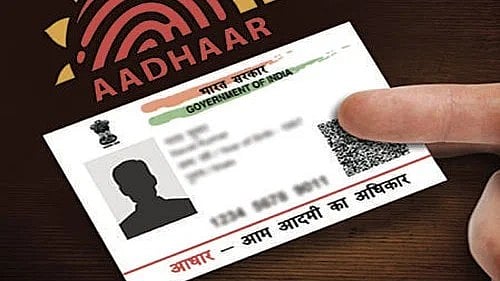
Representative image of an Aadhar card.
Credit: PTI Photo
New Delhi: The Election Commission has told the Supreme Court that Aadhaar card would be allowed only to be used as "proof of identity and not of citizenship," for for the purpose of revision of electoral rolls.
"Aadhaar is only being used as a proof of identity in terms of Section 23(4) of the Representation of the People Act, 1950," the poll panel said in an affidavit in a PIL filed by advocate Ashwini Kumar Upadhyay.
The EC said that it had already issued instructions in this regard.
The EC's assertion came in a reply to interlocutory application by Upadhyay, seeking a direction against the use of Aadhaar as proof of date of birth in Form 6 used for the registration of new voters.
The constitutional body said that by the Election Laws (Amendment) Act, 2021, Section 23 of the RP (Representation of People's) Act, 1950 was amended to enable the linking of electoral roll data with the Aadhaar ecosystem, with the objective of curbing multiple enrolments of the same individual in different places. Based on this amendment, Form 6 was also amended with effect from June 17, 2022.
It also referred to the Office Memorandum of August 22, 2023 of the UIDAI which has clarified that Aadhaar is not proof of citizenship, residence, or date of birth. It further referred to Section 9 of the Aadhaar Act 2016, which stated that Aadhaar number is not a proof of citizenship or residence.
The EC said this court had on September 8, 2025 stated that the Aadhaar card was to be used for the purpose of establishing identity in view of Section 23(4) of the RP Act, 1950.
"That Section 19 of the RP Act, 1950 provides for the conditions of registration in the electoral roll i.e., eighteen years of age on the qualifying date and is ordinarily resident in a constituency. This provision operationalizes and gives effect to the constitutional mandate under Article 326," it said.
The EC also said that Section 23 of the RP Act, 1950 provides for the inclusion of names in electoral rolls and its sub-section (2) provides that the Electoral Registration Officer may direct the inclusion of the name of an applicant after proper verification of facts in such manner as may be prescribed.
The Form 6 of the Registration of Electors Rules, 1960, which was made by the central government after consulting the Commission under Section 28 of the RP Act, 1950 provides for the application form for new voters or for making claim to be included in the electoral roll as provided under Rule 13(1) and 26 of the RE Rules, 1960, it said.
On October 7, the court issued notice on Upadhyay's application.
The bench had observed that the apex court had already said Aadhaar was not the proof of citizenship and domicile.
The application was filed in a pending plea seeking a direction to the EC to conduct Special Intensive Revision of electoral rolls at regular intervals throughout the country.
